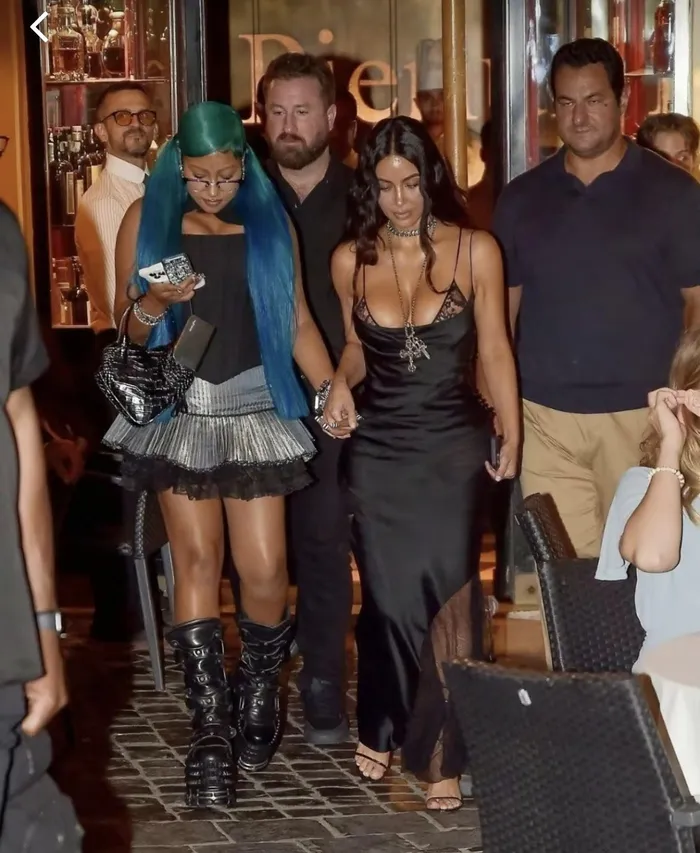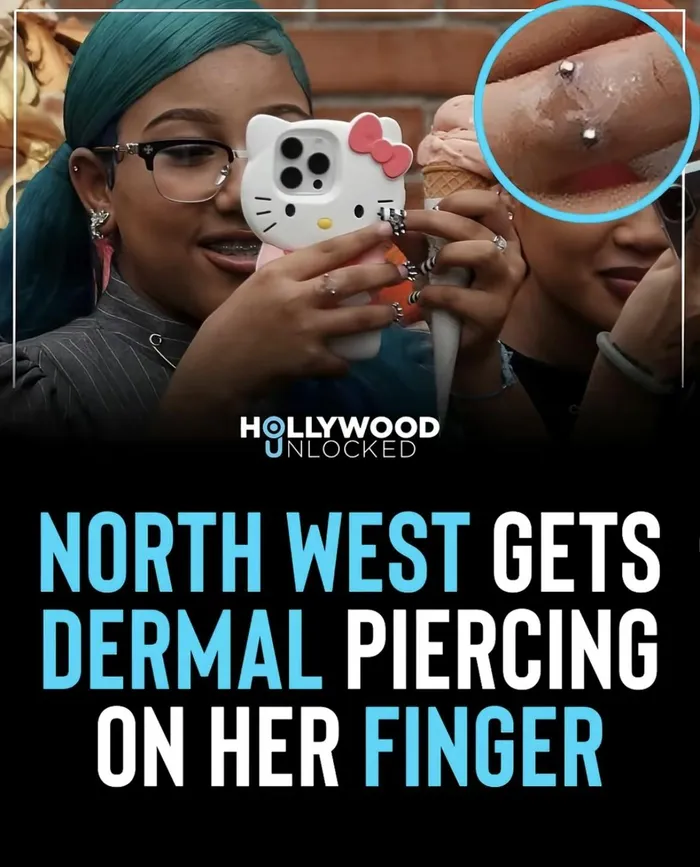Kim Kardashian and North West: the tween dermal piercing debate that has everyone talking

Kim Kardashian in Venice with 12-year-old daughter, North West, who seemingly made her own fashion statement.
Image: Instagram
When Kim Kardashian graced the red carpet at the DVF Awards in Venice last month, her elegant black silk gown and prestigious honour were just the beginning.
The spotlight quickly shifted to her 12-year-old daughter, North West, who seemingly made her own fashion statement that sent shockwaves through social media: a dermal piercing on her middle finger.
Within hours, photos and TikTok clips of North’s accessory spread online, sparking a fiery debate about parenting, celebrity influence, and whether kids are ready for body modifications that even most adults hesitate to get.
What exactly is a dermal piercing?
Unlike standard piercings that have an entry and exit point, dermal piercings, sometimes called microdermals, involve anchoring a piece of jewellery beneath the skin. They’re semi-permanent, more prone to rejection, and tricky to heal, especially in areas with constant movement like the hands.
Body Electric Tattoo owner Brian Keith Thompson, a professional piercer in Los Angeles, told "People" that dermals require a level of maturity during the healing process.
“That’s why I don’t perform them on anyone under 18. They’re not dangerous, but they’re high-maintenance and can be ripped out very easily.”
According to the Association of Professional Piercers (APP), dermal piercings come with risks such as scarring, infection, and long-term rejection. Most reputable studios worldwide enforce an 18+ rule, even with parental consent, to protect minors from complications.
The celebrity parenting dilemma
Did North, at just 12, have a dermal piercing? That’s the question dividing fans, critics, and parents online. For some, it’s an example of Kim Kardashian allowing her daughter to embrace self-expression. For others, it’s reckless parenting.

North West, who seemingly made her own fashion statement that sent shockwaves through social media, a dermal piercing on her middle finger.
Image: Instagram
Social media reactions range from supportive, arguing that piercing is a personal choice and a cultural norm in many communities, to outright outrage.
“Any piercer who would do this on a child, even with parental consent, needs their license revoked,” one Reddit user wrote. Another described it as “disturbing,” pointing to the physical and emotional risks of advanced piercings for children.
It’s not the first time Kim’s parenting has raised eyebrows. Recently, she declared on Kai Cenat’s Mafiathon 3 livestream that she doesn’t believe in homework, sparking yet another debate on modern parenting styles.
“Kids are in school for eight hours a day,” she said. “When they come home, they should do sports, have a life and spend time with family.”
Her sister Kourtney Kardashian has also made headlines for unconventional parenting, questioning whether traditional schooling is even necessary. In a May podcast with Khloé, she quipped: “Why do kids f******g go to school? I love to go against the grain.”
What we’re witnessing with the Kardashian kids is a larger conversation about parenting styles in the celebrity era.
According to developmental psychologist Dr Diana Baumrind, who pioneered research on parenting, styles range from authoritative (high expectations balanced with warmth) to permissive (low rules, high freedom).
Celebrities like Kim and Kourtney often lean toward permissive parenting, encouraging individuality and breaking tradition, but this approach can attract criticism when children make choices typically reserved for adults.
Closer to home, actress and TV personality Khanyi Mbau’s parenting style has come under fire after she revealed that her daughter lives in her own apartment at age 15.
She was speaking during a dinner sit-down on the African reality show, "Young, Famous & African", which premiered on Netflix.
Parents have different approaches to parenting, with some being more progressive than others.
Progressive parenting, sometimes referred to as indulgent or permissive parenting, gives kids little direction or supervision and largely lets them do as they like.
This type of parent reportedly only intervenes when there is a significant issue. Typically, they adopt a friend-like relationship rather than a parental position. They frequently don't make much of an attempt to deter undesirable decisions or actions.
Furthermore, it cannot be easy parenting in the public eye, which complicates everything. Celebrities’ children often grow up faster, exposed to adult decisions before they’re emotionally equipped to handle the consequences.
Whether you agree with Kim or not, the piercing incident highlights important lessons for all parents navigating tween years:
1. Understand the risks. According to the Mayo Clinic, minors are more susceptible to piercing complications due to less consistent hygiene practices.
2. Teach responsibility gradually. Experts recommend starting with simple ear piercings, letting children practice cleaning and care before moving on to complex modifications.
3. Balance autonomy with safety. Giving tweens room for self-expression is healthy, but boundaries around permanent or high-risk decisions are crucial.
4. Acknowledge cultural influence. From TikTok trends to celebrity kids, children are watching and comparing themselves constantly. Parents need open conversations about why “what’s trending” isn’t always